- Home
- A. J. Hartley
Will Power wh-2 Page 5
Will Power wh-2 Read online
Page 5
“This has something to do with the ambassador,” I muttered.
“Quite possibly,” said Mithos, himself again.
“If I ever see that bloke again. .” I began, but couldn’t think of anything that seemed suitable. “I’ll bet he drugged us and then drove us somewhere, dumped us and waited for us to come round. . ”
“Hundreds, maybe thousands of miles?” said Renthrette skeptically, but too confused herself to give the remark the withering disdain she would have mustered in other circumstances.
“If I’ve been unconscious,” said Orgos, “it hasn’t been for long. My beard hasn’t grown.”
“Maybe he shaved you,” I tried, lamely. Everyone ignored me and turned their eyes back to the mountains. A cold wind rippled the meadow in which we stood and, for the first time, I felt the chill of winter. Something was very badly wrong. It had been early autumn when we set out.
“So where to now?” Renthrette mused aloud.
“Shelter,” said Mithos, “and any signs of people we can track to civilization.”
“Which way?” said Orgos.
No one replied for a second, and then, with a half-shrug and no word of explanation, Mithos began walking across the valley. We followed, eventually, Renthrette remounting her horse, Orgos catching up with Mithos and striding silently along with him. I brought up the rear, in a stunned silence.
If the sun was going down, then we must be heading north. Presuming, of course, that the sun still set in the west. For all I knew, round here the sun might rise in the south, hang around for a bit and then go back the way it came. Maybe it didn’t go down at all, and would turn into the moon, or a side of beef. .
This was getting me nowhere, except perhaps on a fast horse to mental collapse. With that in mind, I chose to focus on what was, rather than what might be. In truth, I still suspected that what was was more a matter of what seemed to be, but there was clearly little point in dwelling on the distinction. My brain hinted that we’d get past the first mountain and find Vetch nestling at its foot as expected, and there would be the ambassador looking lost and hurt and saying, “Where on earth did you get to? I just turned my back for a moment and. .”
Yes, not very plausible. Less plausible, in fact, than the aggressively real brush of the long grass about my ankles or the wind that burned my ears with each frosty gust. I pulled my totally inadequate jerkin tight about me and tried to pick up the pace a little before bits of me started falling off.
After almost an hour we had made our way to one side of the valley. There we came upon a stream, frozen at the edges, but fast and clear. Crossing it brought us to an embankment of some sort, like the wall of a dam formed by the scree and rubble which fell from the mountain. After a moment’s deliberation, we scrambled up it awkwardly, sending little avalanches in our wake. Renthrette and Orgos had to virtually drag the skittish horse up the treacherous slope. I slid halfway down and took the skin off the palms of my hands trying to stop myself. The others waited silently at the top for me, showing the kind of patience that you might bestow on an imbecile child as he failed repeatedly to spell the word “moron.” By the time I got up, sweating in spite of the bitter wind, even the horse looked bored.
A few steps, however, swept this mood away. For atop the embankment was a cinder trail that wound its way through the mountains. It promised more than shelter, it promised civilization. Given that I was freezing, irritated, totally confused, and bleeding slightly from wounds too minor to get any real sympathy, that promise was as good as a hot bath, a joint of venison, and a flagon of strong ale. Well, not quite, but you take my point.
But the idea of the bath cooled rapidly as we strode along the blackened track for an hour or more with no sign of intelligent life. The road, if that was what it was, felt like it was going somewhere, but it dragged through the mountains, curling aimlessly here, doubling back around an outcrop of rock there, so that its progress was random to say the least. After a while I felt like I was riding some huge, lazy, and very confused-or possibly blind-earthworm. After a second hour, I gave up on the beer and venison, too.
The one thing we did have on the path was protection from the icy wind and, though the air was still crisp and clear, the sun brushed our upturned faces and warmed them gently. Around us the mountains loomed: great angular crags of pale russet and violet-gray, towering as hard and impassive as a gold merchant’s wife and fading into distant peaks white with snow. Of Vetch there was little hope and no sign.
After another hour, the company grew restless again. The sun had clearly begun its descent (in the west?) and we couldn’t go on walking till dark with no plan for what happened if we didn’t stroll into a cleverly concealed city around the next corner. Mithos grew even more surly than usual, and as he muttered earnestly to Orgos, they began walking a little faster. Renthrette, still mounted, trotted up to them and exchanged a few insights on our condition. Apprentice Will, man of dubious talents, tired legs and all-round miserable bastard, trudged behind and counted off all the places I would rather have been.
Suddenly there was a bird call, high and caustically harsh, from in front of us. It was a starling, feathers ruffled, wings aggressively half-spread, and it sat in the bare branches of a small and withered yew tree just left of the path. We hadn’t seen many trees in the mountains, and even one as blasted as this was something of an event. Moreover, the bird’s position in it, coupled perhaps with the way it fixed us with its hard bird eyes, gave it the aura of a guard or sentinel. I couldn’t help but smile as the bird, small though it was, continued to screech its anger at us, flicking its wings and bobbing its head up and down as it called.
Mithos and Orgos stopped in their tracks before reaching the little tree, giving me time to catch up.
“Odd that it doesn’t seem afraid of us,” Mithos remarked.
“Probably used to people ’round here,” I answered, snide. The bird cried again and flashed its wing feathers, dark and glossy as polished steel. Then it took to the air, circled us once, and flew away over a great purple boulder, calling all the time.
That was the highlight of the afternoon. We walked on for another mile or two before Mithos came to an abrupt halt.
“We have only two or three hours of good light left, and there is no sign of a town or an inn,” he said, as if we might have missed that fact. “We are going to have to spend the night outdoors.”
I opened my mouth to protest, but the others seemed quite unmoved by the patent idiocy of this suggestion so, for the moment, I held my peace.
Turning to Renthrette, Mithos asked what we had with us.
The saddlebags on the horse were the only luggage that had completed the “journey” from the Black Horse. Most of the rest had been inside the carriage, and we had been traveling light even then. Now, as Renthrette’s quick inventory of the leather satchels across her mount made clear, we were virtually weightless.
“Two blankets, flint and tinder, an oil lamp, one small hatchet, some bread and cheese, and a length of rope. About thirty feet,” she said, not exactly exuberantly.
“No tent?” I ventured.
“Did I mention one?” she snarled, her eyes still on Mithos and Orgos.
“Then you’ll have to build a bivouac,” I said. Actually, I was far from clear what bivouacs were, though they were reputed to save the lives of outdoor types from time to time.
“Do you see large numbers of trees around here?” Renthrette spat, lips curled with that special talking-to-Hawthorne contempt.
“What?”
“Branches,” she said. “Leafy boughs? Clods of soft earth and turf? Yards of twine or vines to hold the thing together?”
Her scorn suggested that these things were somehow connected, even integral, to bivouacs, and that construction of one in our present conditions seemed unlikely.
“You, no doubt,” I began, “would rather construct a three-story villa with a pool and one of those tiled porches with a little fountain and. .”
“Shut up, Will,” said Orgos, thoughtfully.
“I was only trying to be helpful,” I said.
“We need to find a cave,” said Mithos with a shrug. “And we’ll need to build a fire, so gather what wood you see as we go. There won’t be much, and we’ll need all we can get. Renthrette, you can walk from here. Use the rope to bundle up the firewood and tie it to the saddle.”
She nodded once and slipped easily from the horse’s back, managing to hide her inevitable disappointment at no longer being the mounted escort poised to charge any dangerous but misguided beast that should come lumbering down the mountain into range.
Above us came a screeching call, so sharp and loud that we all turned our eyes upward.
“A kite,” said Orgos.
“No,” I corrected him, “it’s a bird.”
“A kite is a bird, idiot,” he said without malice. “A kind of hawk.”
The bird was circling perhaps a hundred feet overhead, its tail black and forked like a swallow’s and its head down, watching. Its head and body were a brilliant white, even against the pale sky, and set off the black of the tail and wings strikingly. I was about to turn away from this before Orgos started one of his lectures on the wonders of nature, when a curious thing happened. A smaller bird flew up to the kite, chirping shrilly, then veered off and swooped low at us with only a yard or two of clearance.
“A starling,” said Orgos. There was a note of confusion in his voice as his eyes followed the smaller bird to where it rejoined the kite, calling as before. The raptor, continuing to glide in tight circles, wings out straight, pinions splayed, returned a series of sharp whistles.
“It’s not a starling,” said Mithos, eyes upturned. “I mean, it’s not a starling, it’s the starling. The one we saw before.”
“Based on what?” I asked. “You’ve seen one starling, you’ve seen ’em all.”
“Based on nothing,” said Mithos, dropping his eyes to mine. “A hunch. A sense of being watched.”
This was, of course, quite absurd, but “absurd” is not a word which leaps to the lips when confronted with Mithos giving you one of those looks. Orgos? Maybe. Renthrette? Certainly, though you should expect to pay for it. But Mithos? Absurd? No. Mithos kept himself to himself, showing little emotion and letting the world go on around him till he told it to stop. When he gave orders, people followed them without question because he seemed so sure of his own mind and so dangerous to challenge. Not that he was violent or overtly threatening, you understand. He was just grim and powerful. Yes, that’s the word: powerful, in every sense.
Now, though my brain said that the idea that these birds were keeping an eye on our progress and discussing it over a sandwich and a couple of pints was preposterous, the fact that it was Mithos who had said so gave it a kind of weird credibility. Renthrette watched him for a moment as if expecting further explanation, but he did not give any, and when she turned away, her face was blank, expressionless. Orgos nodded thoughtfully to himself and advanced along the cinder track, eyes skinned for an opening in the rock that would get us out of the freezing night winds.
I watched as they set off again and wondered, as I have often wondered in their company, what the hell I was doing with these people.
The cave which Mithos’s keen eyes picked out of the mountainside was almost obscured by a great slab of granite. Behind it a fissure in the rock admitted us into a short corridor which we passed through two abreast, and thence into an L-shaped chamber, a long entrance stretching back into the cliff and then curving left through a narrow fissure. Its walls were irregular, in parts jutting out sharply, and it was, if anything, colder than it had been outside.
I crossed the uneven floor with a sour look on my face: There was a musty, almost rancid scent to the place and the air was moist as well as cold. Droplets of water pearled on my face. I brushed them off, wandering to the back of the cavern and the hollow, which cut to the left. This was dry, though much of the larger cavern (the two parts of the L were virtually separate “rooms”), was mossy, and a thin slime covered the floor by the entrance, where a trickle of water ran down the wall. No hand had carved the cave: only the wind, the rain, and the awesome splitting power of freezing winter and spring thaw, if spring ever came to this frigid wind-trap.
“Excellent,” said Orgos in a voice apparently without sarcasm.
“Just like home,” I added.
“We’ll soon warm it up once we’ve got a fire going,” said Mithos. “Renthrette, see if you can hang the blankets across the doorway. Keep the wind out.”
The horse was led inside, much to my distaste, and offered what little greenery Renthrette had found.
“Must we sleep with the animal?” I whined.
Renthrette gave me an angry stare and said, “We’ve had to ever since you joined us.”
“Funny,” I observed. “I mean that great stinking manure factory.”
Renthrette glanced at the horse to make sure it hadn’t been offended.
“Can’t leave it outside,” said Mithos. “There may be wolves about.”
“Oh, great,” I said. “Knowing our luck we’ve probably holed up in their den. The horse would be safer as far from here as possible.”
“No animals have lived here lately,” said Orgos, our resident naturalist. “There’s no dung, bones, or anything.”
“Pity,” I said. “There might have been something edible. Do we have anything for dinner at all?”
“One loaf of bread and a block of goat cheese,” said Orgos, fishing through a saddlebag.
“I suppose we could always eat the horse,” I mused. “Better than sleeping with it.”
“I’d rather sleep with the horse than with you,” Renthrette snapped.
“I’ll bet,” I said. “I’d suggest you invite it over for dinner first, but since we’ve sod-all to eat. .”
“Give it a rest, Will,” she muttered, balefully. Orgos grinned at me briefly and then joined Mithos in the center of the chamber.
They squatted down and began striking the steel and flint into the few dry leaves we had managed to find. When a flame appeared they cupped hands around it, whispering nurturing words as they fed it twigs and blew softly at its base. Renthrette joined them and the three of them crouched together, urging the fire to life as if tending a newborn calf, willing it to breathe or to take its first step. I watched from the back of the chamber, oddly distant from their seemingly familiar ritual. When the flames were strong enough to set their teeth to some of the larger branches we had gathered, the group shared a collective smile of comradeship and achievement. I shivered, as much at the exclusion as at the cold.
The cave did warm up, and within an hour or so, after a meager supper and the smallest gulp from Orgos’s water flask, I was as comfortable and ready to sleep as I was likely to get. The four of us were seated quietly around the fire, watching it as we had done months before, only days after I met them. Bearing that in mind, I was half expecting the request for a tale of some sort when it came. It was, after all, pretty much all I could do. What I wasn’t expecting was that it should come from Renthrette.
“Got a suitable tale, Will?” she asked.
I gave her a searching glance, but her eyes were lost in the fire. Briefly they flicked up to me, expressionless, then returned to the hearth without comment.
I considered for a moment, then spoke. “Once upon a time, in a land far away, there lived a girl with hair like spun gold and eyes of blue clear as a spring sky. She was fourteen and lived with her brother and her parents in a town that sat in a range of tall, imposing mountains. The parents doted on the girl and gave her everything she could wish for and, since they lived in a fine, spacious house with a maid and a butler and a nurse for the children, she did as she pleased and was as happy as a girl has ever been in life or story.
“But one day, her father came home from the market and his face was anxious. He was distant, preoccupied, and barely looked at the girl when she asked him w
hat he had brought for her today. She was upset and sought out her brother. Together they watched as her father’s worry spread to their mother and among the servants, but they did not know why until there was a loud rapping at the door.
“A man was outside, dressed in armor and a white cloak. His face was stern, and twenty other soldiers stood in ranks behind him, all with spears and shortswords. The children watched as the soldiers marched into the house and began helping themselves to food, drink, and whatever valuables they came upon. Plates were smashed; ancient crystal, passed on through the family, was brushed aside to shatter in pieces on the floor; and priceless furniture was overturned and chopped up for firewood. The servants, beaten by the soldiers, fled. The mother wept loudly over the ruins of her possessions and the father sought out the soldiers’ commander, pleading with him to spare the rest of their belongings.
“But the soldiers just laughed and went on stealing and destroying everything in the house. Then one of them caught sight of the girl, and, catching her by the hair, he thrust her against the wall. As others gathered around them, the father burst in upon them with a hatchet and felled one of the men with a single blow. The others turned on him with their swords. The mother ran to tear them from her husband, but it was too late, and she too received her death wound. The children saw all this, but were too afraid to weep. Instead they fled, from the house, from the town, from the mountains.
“They fled for several years, living from hand to mouth, hiding in the streets, lurking in shadows, learning the ways of the downtrodden and the poor. Learning to hate the soldiers in their armor and white cloaks. . ”
“Is this your idea of humor, Will?”
I looked up from the fire to find Renthrette staring at me. Her face was drawn tight and her already pale skin had a strange bleached quality. Her eyes were cold but full of rage.
“I’m sorry?” I said.
She gave me a long, hard look, and the anger in her eyes froze hard. Then, quite suddenly, and with a studied casualness which did not register in her face, she rose to her feet. “Forget it,” she said, then added, “I’m going to get some sleep.” She walked toward the back of the cave, gathering up one of the blankets in a single, irritable gesture.

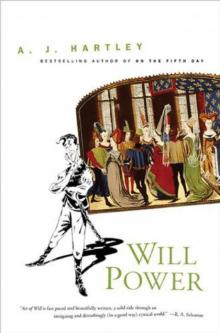 Will Power wh-2
Will Power wh-2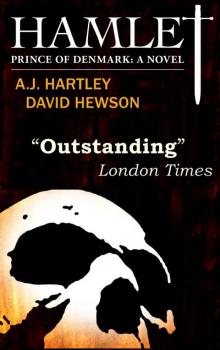 Hamlet, Prince of Denmark
Hamlet, Prince of Denmark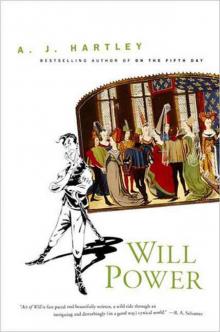 Will Power
Will Power Firebrand
Firebrand A Novel
A Novel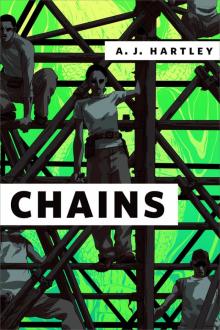 Chains
Chains Guardian
Guardian Darwen Arkwright and the School of Shadows
Darwen Arkwright and the School of Shadows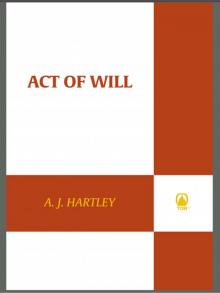 Act of Will
Act of Will Darwen Arkwright and the Insidious Bleck
Darwen Arkwright and the Insidious Bleck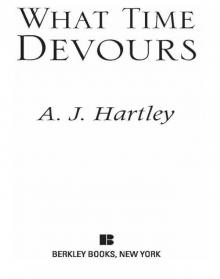 What Time Devours
What Time Devours